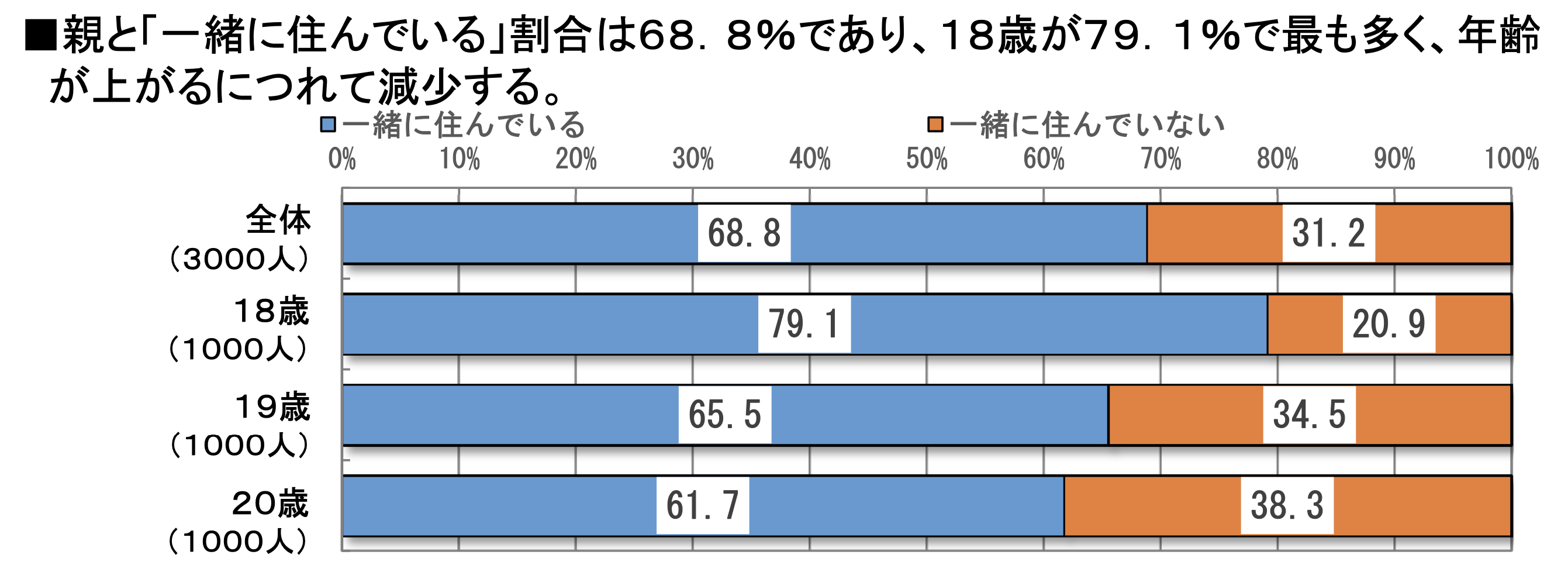Looking at voter turnout, teenagers are more likely to vote than those in their twenties.
The 20s include a wide range of ages, from 21 to 29, while the teens include only 18- and 19-year-olds.
Why is teenage voter turnout so high?
I have the opportunity to become familiar with elections and politics in high school.

Ministry of Internal Affairs and Communications, "Summary of Survey on Attitudes Toward Voting Rights of 18-Year-Olds."
Teenagers who have just taken classes on elections and politics in high school about them.
It is thought that a higher percentage will go to the polls because they have just learned about the importance of elections in school and are curious to actually do it.
In order to improve voter turnout, it is necessary to provide opportunities to deepen understanding of elections not only for children but also for the general public.
I'm following my own parents' practice of going to the polls.

総務省の「18歳選挙権に関する意識調査の概要」
Ministry of Internal Affairs and Communications, "Summary of Survey on Attitudes Toward Voting Rights of 18-Year-Olds."
Those who have followed their parents in elections since childhood are in the habit of going to the polls and will do so when they are eligible to vote.
We find that parental voting behavior significantly influences teenage voter turnout.
With regard to increasing youth voter turnout, it can be said that an awareness campaign will be needed at the same time to increase parents' voter turnout.
Encouraged to go by parents who live with them.

Ministry of Internal Affairs and Communications, "Summary of Survey on Attitudes Toward Voting Rights of 18-Year-Olds."
It is thought that there is a sense of obligation that they receive from their parents who encourage them to vote by living with them.

Ministry of Internal Affairs and Communications, "Summary of Survey on Attitudes Toward Voting Rights of 18-Year-Olds."
We see that teenagers are more likely to vote because they emulate their parents' voting habits or are encouraged to do so by their parents. However, voting rates drop when they reach their 20s.
This is indicative of a trend among young people who lack a firm sense of obligation to vote and who, as they leave their parents' homes, become less influenced by their parents and less likely to vote.
As these younger voters grow older and become the parents' generation, they will no longer consider voting as an obligation, resulting in a decline in voter turnout, which in turn will lead to a decline in voter turnout among the next generation of young voters.
This cycle repeats itself and becomes a vicious cycle, which is thought to be the true cause of the decline in voter turnout among young people.
The Corona disaster made many people realize the importance of politics.
High school and college students do not yet have as stable an income as full-fledged adults, so the coronavirus must have hit the young people hard.
Qualitative improvement in sovereign education was observed.
Since the initial introduction of voting rights for 18-year-olds in 2016 was difficult to deal with political neutrality, and there were scattered cases where school boards and politicians saw it as a problem,
many schools subsequently dealt with content as bland as possible (fictitious political parties, etc.),
but this time we are seeing many cases where real parties and politicians are dealt with, making this a highly effective sovereignty education.
SDGs education is also encouraging an increase in the number of young people interested in social issues.

That more young people are participating in politics in ways other than voting.
The number of signatures on the online signature site "change.org" has increased 2.5 times that before the Corona disaster, and the number of teenagers launching signatures on issues such as school rules and measures against molestation is remarkable.
The Japan Youth Council (a political and student organization in Japan), whose aim is to reflect the opinions of young people in decision-making and to help create a society where young people and future generations can live.
The Japan Youth Council (a Japanese political and student organization that aims to reflect the opinions of young people in policy-making and to help create a society in which young people and future generations can live comfortably) has more than 700 individual members (64 organizations) and continues to add at least one new member per day.
Other movements for climate change action, started by then 15-year-old Greta Toonberg (now 18), are spreading in Japan and having a significant impact on her generation around the world.
Considering that there are more than 2 million young voters, the number of young people participating in such activities is very small, but if their friends and acquaintances participate in such activities,
they will naturally have more opportunities to come into contact with politics, and thus the voting rate is expected to increase in the future.
The transmission of the value of voting in schools may play an important role in the process of political socialization,
in which the sense of obligation to vote and the desire to vote increase during childhood.
Regarding socialization by family, there is a relationship between mothers' attitudes and children's attitudes in both willingness to vote and sense of internal political efficacy,
and 18- and 19-year-olds are more likely to be influenced by their parents because a larger percentage of them live with their parents.
It is also believed that young people are increasingly thinking about politics in terms of domestic as well as global issues.